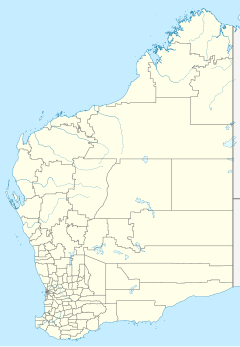Glenflorrie
22°56′10″S 115°58′55″E / 22.936°S 115.982°E
Glenflorrie Station, also known as Glen Florrie Station, is a pastoral lease that operates as a cattle station. It is located about 147 kilometres (91 mi) south of Pannawonica and 175 kilometres (109 mi) west of Paraburdoo in the Pilbara region of Western Australia, and occupies an area of 1,970 square kilometres (761 sq mi).
It is currently owned by Murray and Aticia Grey. The Grey family have been producing Brahman cattle for the live export trade.[1]
The property is watered by Glenflorrie Creek. It lies between the Ashburton and Henry Rivers,[2] and shares boundaries with Uaroo Station.[3] The traditional owners of the area are the Tharrkari people, who currently lease and manage Ullawarra Station.[4]
Glenflorrie was established at some time prior to 1894.[5] In 1896 the property was running both sheep and cattle.[6] The property was acquired by G. W. Hall at some time prior to 1900.[7] Hall placed the property up for auction in 1919. At this time Glenflorrie occupied an area of 630,481 acres (255,147 ha) and was stocked with 7,000 sheep, 300 cattle and 50 horses.[2]
The Higham brothers sold Glenflorrie to the Greenway brothers in 1937.[8]
In 1952 the original homestead was gutted by fire. The new homestead that was being built adjoining the old one was not damaged. At this time the owner of the property was Ron Greenway.[9]
In 2009, the Thudgari Aboriginal people were awarded native title of some 1,200 square kilometres (463 sq mi) in the area including Glenflorrie, Maroonah and Mangaroon Stations. The land use agreement allows the Thudgari access to their traditional lands to hunt, gather and camp.[10]
See also
[edit]References
[edit]- ^ "Ambassadors for live exports". Queensland Country Life. News Limited. 8 April 2008. Archived from the original on 29 April 2014. Retrieved 28 April 2014.
- ^ a b "Advertising". Western Mail. Perth. 13 November 1919. p. 14. Retrieved 28 April 2014 – via National Library of Australia.
- ^ "Station Reports" (PDF). Department of Agriculture. 1980. Retrieved 5 April 2014.
- ^ "Tharrkari – The People and their Traditional Country". Wangka Maya Pilbara Aboriginal Language Centre. 2012. Retrieved 10 May 2014.
- ^ "Advertising". Western Mail. Perth. 29 September 1894. p. 40. Retrieved 28 April 2014 – via National Library of Australia.
- ^ "Upper Ashburton News". The West Australian. Perth. 12 June 1896. p. 7. Retrieved 28 April 2014 – via National Library of Australia.
- ^ "The Northern Times". The Northern Times. Carnarvon, Western Australia. 25 January 1908. p. 2. Retrieved 28 April 2014 – via National Library of Australia.
- ^ "Onslow News". The Northern Times. Carnarvon, Western Australia. 6 October 1937. p. 3. Retrieved 29 April 2014 – via National Library of Australia.
- ^ "Onslow News Items". The Northern Times. Carnarvon, Western Australia. 15 May 1952. p. 3. Retrieved 28 April 2014 – via National Library of Australia.
- ^ Laurissa Smith (18 November 2009). "Thudgari people claim native title rights in the Upper Gascoyne". Australian Broadcasting Corporation. Retrieved 4 May 2014.

